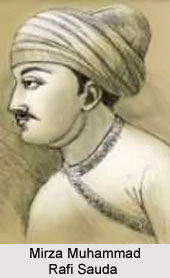 Sauda, a leading Urdu poet of his time, was better known as Mirza Muhammad Rafi. Sauda was born in the year 1713. His accomplishments were a cause of pride to the city of Delhi. His father Mirza Muhammad Shafi was from the aristocratic family of Kabul. His ancestors were soldiers by profession. Mirza Shafi came to India by means of trade. According to some, he got his pen-name `Sauda` from his father`s profession (Saudagar).
Sauda, a leading Urdu poet of his time, was better known as Mirza Muhammad Rafi. Sauda was born in the year 1713. His accomplishments were a cause of pride to the city of Delhi. His father Mirza Muhammad Shafi was from the aristocratic family of Kabul. His ancestors were soldiers by profession. Mirza Shafi came to India by means of trade. According to some, he got his pen-name `Sauda` from his father`s profession (Saudagar).
He was raised and educated in Delhi. His house was in the Kabuli Gate area, which was destroyed in the destruction of Delhi in 1857. Sauda originally wrote poetry in Persian language but on Khan-e-Arzu, his senior and mentor persuasion started writing in Urdu.
Sauda was first the pupil of Sulaiman Quli Khan `Vidad`, and then of Shah Hatim. Shah Hatim in the introduction to his volume in which gives a list of his pupils has recorded Sauda`s name with great pride and he outlived Sauda. He was not a pupil of Khan-e-Arzu, but benefited from his company.
With time he gained fame and recognition, even during his lifetime his Ghazals were on the lips of folks of Delhi. He found patronage in the Mughal king of the time, since he was a man of great pride and honour left the royal court forever over an argument with the king over poetry. But he found numerous patrons among nobles of the time. His fame reached Nawab Shuja ud Daula of Awadh and he got invitation to leave Delhi for Lucknow. At the age of 60 or 66 years he left Delhi, and stayed for some time in Farrukhabad, with Nawab Bangash. He wrote a number of odes in praise of the Nawab. In the year 1771, he arrived in Lucknow in the court of Navab Shuja-ud-Daulah for first and the last meeting with the Nawab and never went back till Asif-ud-Daulah became Nawab of Lucknow.
Work and Contribution of Mirza Muhammad Rafi
Hakim Sayyid Aslah-ud-Din Khan compiled Sauda`s complete works and also wrote an introduction for it. According to Muhammad Husain Azad, his work comprises Urdu odes (Qasidas), some Persian odes, twenty-four masnavis and many tales and versified anecdotes, then a short volume of his Persian poetry. In every form of Sauda`s poetry there are satires that turn the hearts and livers of his enemies sometimes to blood, sometimes to kabobs. He wrote Ghazals, Qasidas (Ode/Panegyric), Marsias (elegies), Salams and Hajvs (lampoon/ satire).
His marsias were different form later Marsia writers like Anis and Dabeer, each stanza consists of four-liners or four verses known as Ruba`i or quatrain.



















